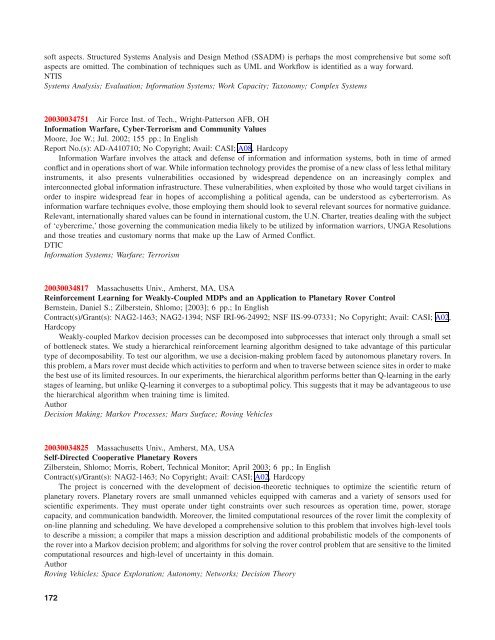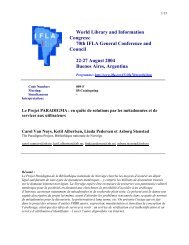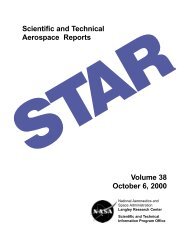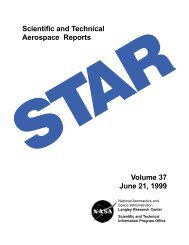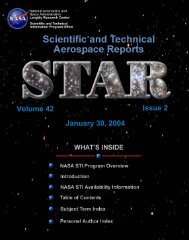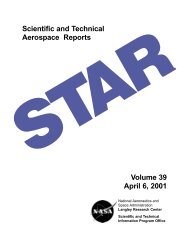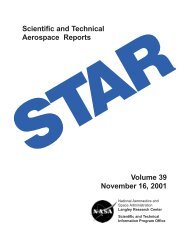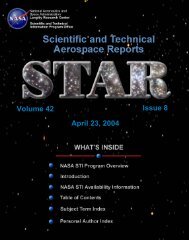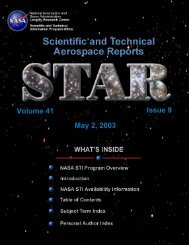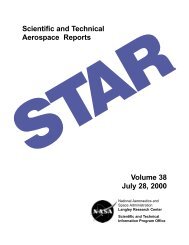Issue 10 Volume 41 May 16, 2003
Issue 10 Volume 41 May 16, 2003
Issue 10 Volume 41 May 16, 2003
- TAGS
- volume
- 202.118.250.135
You also want an ePaper? Increase the reach of your titles
YUMPU automatically turns print PDFs into web optimized ePapers that Google loves.
soft aspects. Structured Systems Analysis and Design Method (SSADM) is perhaps the most comprehensive but some soft<br />
aspects are omitted. The combination of techniques such as UML and Workflow is identified as a way forward.<br />
NTIS<br />
Systems Analysis; Evaluation; Information Systems; Work Capacity; Taxonomy; Complex Systems<br />
<strong>2003</strong>0034751 Air Force Inst. of Tech., Wright-Patterson AFB, OH<br />
Information Warfare, Cyber-Terrorism and Community Values<br />
Moore, Joe W.; Jul. 2002; 155 pp.; In English<br />
Report No.(s): AD-A4<strong>10</strong>7<strong>10</strong>; No Copyright; Avail: CASI; A08, Hardcopy<br />
Information Warfare involves the attack and defense of information and information systems, both in time of armed<br />
conflict and in operations short of war. While information technology provides the promise of a new class of less lethal military<br />
instruments, it also presents vulnerabilities occasioned by widespread dependence on an increasingly complex and<br />
interconnected global information infrastructure. These vulnerabilities, when exploited by those who would target civilians in<br />
order to inspire widespread fear in hopes of accomplishing a political agenda, can be understood as cyberterrorism. As<br />
information warfare techniques evolve, those employing them should look to several relevant sources for normative guidance.<br />
Relevant, internationally shared values can be found in international custom, the U.N. Charter, treaties dealing with the subject<br />
of ‘cybercrime,’ those governing the communication media likely to be utilized by information warriors, UNGA Resolutions<br />
and those treaties and customary norms that make up the Law of Armed Conflict.<br />
DTIC<br />
Information Systems; Warfare; Terrorism<br />
<strong>2003</strong>0034817 Massachusetts Univ., Amherst, MA, USA<br />
Reinforcement Learning for Weakly-Coupled MDPs and an Application to Planetary Rover Control<br />
Bernstein, Daniel S.; Zilberstein, Shlomo; [<strong>2003</strong>]; 6 pp.; In English<br />
Contract(s)/Grant(s): NAG2-1463; NAG2-1394; NSF IRI-96-24992; NSF IIS-99-07331; No Copyright; Avail: CASI; A02,<br />
Hardcopy<br />
Weakly-coupled Markov decision processes can be decomposed into subprocesses that interact only through a small set<br />
of bottleneck states. We study a hierarchical reinforcement learning algorithm designed to take advantage of this particular<br />
type of decomposability. To test our algorithm, we use a decision-making problem faced by autonomous planetary rovers. In<br />
this problem, a Mars rover must decide which activities to perform and when to traverse between science sites in order to make<br />
the best use of its limited resources. In our experiments, the hierarchical algorithm performs better than Q-learning in the early<br />
stages of learning, but unlike Q-learning it converges to a suboptimal policy. This suggests that it may be advantageous to use<br />
the hierarchical algorithm when training time is limited.<br />
Author<br />
Decision Making; Markov Processes; Mars Surface; Roving Vehicles<br />
<strong>2003</strong>0034825 Massachusetts Univ., Amherst, MA, USA<br />
Self-Directed Cooperative Planetary Rovers<br />
Zilberstein, Shlomo; Morris, Robert, Technical Monitor; April <strong>2003</strong>; 6 pp.; In English<br />
Contract(s)/Grant(s): NAG2-1463; No Copyright; Avail: CASI; A02, Hardcopy<br />
The project is concerned with the development of decision-theoretic techniques to optimize the scientific return of<br />
planetary rovers. Planetary rovers are small unmanned vehicles equipped with cameras and a variety of sensors used for<br />
scientific experiments. They must operate under tight constraints over such resources as operation time, power, storage<br />
capacity, and communication bandwidth. Moreover, the limited computational resources of the rover limit the complexity of<br />
on-line planning and scheduling. We have developed a comprehensive solution to this problem that involves high-level tools<br />
to describe a mission; a compiler that maps a mission description and additional probabilistic models of the components of<br />
the rover into a Markov decision problem; and algorithms for solving the rover control problem that are sensitive to the limited<br />
computational resources and high-level of uncertainty in this domain.<br />
Author<br />
Roving Vehicles; Space Exploration; Autonomy; Networks; Decision Theory<br />
172


